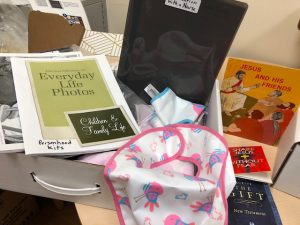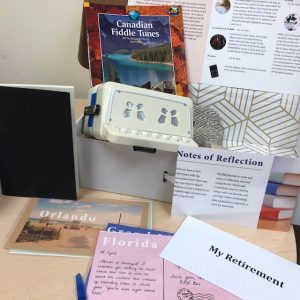
A resident’s personhood kit
In his book, Dementia Reconsidered: The Person Comes First (1997), Professor Thomas Kitwood defines personhood as, “A standing or status that is bestowed upon one human being by others, in the context of relationship and social being. It implies recognition, respect, and trust.[i]”
More than 23 years later, Kitwood’s definition continues to shape person-centred care, and has formed the basis for the Personhood Kit Project, being developed by New Brunswick long-term care facility Loch Lomond Villa, with support from the Centre for Aging and Brain Health Innovation’s (CABHI) Spark Program.
Person-centred care recognizes the inherent value and dignity in human life. Kitwood was the first to expand the term to dementia care,[ii] highlighting that every life, regardless of cognitive and physical ability, should be guarded as sacred and unique.[iii]
When practiced, person-centred care can help caregivers provide effective, personalized support to their clients, instead of the traditional one-size-fits-all medical approach.
As dementia progresses, verbal communication and memory recall decreases – reducing a person’s ability to assert their needs, interests, and values. The Personhood Kit Project, launched in 2017, acts as a portal into the lives of those living with dementia, helping them to tell the world who they are and what aspects of their lived experiences make them unique.
Thinking inside the Box
The kit is comprised of four key components: family, hobbies, attributes, and occupation. Items in the kit can include things like an instrument the resident enjoys playing, or memorabilia from their careers. Together, the items tell a story of the resident’s values, interests, and identity. Staff can use the kit to get to know residents better or engage them in meaningful face-to-face interaction. As a result, care can shift from a task-oriented to relationship-based approach, says Shelley Shillington, Director of Operations at Loch Lomond Villa and the Personhood Kit Project lead.
“Human beings are made for relationships,” says Shillington. “To build a relationship with a person living with dementia, you have to understand their story.”
After launching the project, Shillington noticed the kits were improving the residents’ overall moods and levels of engagement – an indication of heightened well-being.
“There was one lady who was a great horticulturist,” says Shillington. “We would have pots and she would make her arrangements with plastic flowers. She would focus on the task and actually complete it, whereas before she wouldn’t really engage in activity time.”
Family members can add information and materials to the kits, which creates an opportunity for them to support their loved ones’ care, even when they are not physically present.
Seeing Beyond Dementia
 The Personhood Kits have the potential to reshape how caregivers respond to challenging behaviours associated with dementia, such as agitation or resistance.
The Personhood Kits have the potential to reshape how caregivers respond to challenging behaviours associated with dementia, such as agitation or resistance.
“People’s stories are so important to who they are,” says Jillian Higgins, Recreation Therapist at Loch Lomond Villa. “When a resident is having difficulty receiving care, you can look at their bio and say, well maybe they’re having a hard time because of something they told us here. It gives you a different perspective on the behaviour they’re showing you.”
“It changes your whole approach,” Shillington adds. “Instead of seeing a person with dementia, you see Cyril who loves music and enjoys organizing things.”
Shillington and her research team began the project with a goal of engaging 25 residents from their Cedar House, a portion of the Loch Lomond facility that specializes in dementia care. Now she seeks to engage any resident that would gain from participating in the program.
“We’ve built a procedure to keep this program going and can make the content specific to more residents who would potentially benefit from the Personhood Kit.”
With a focus on advancing quality, person-centred dementia care, Shillington and her team are poised to make a difference in the lives of older adults for years to come.
[i] https://www.bayshore.ca/2018/02/14/dementia-and-personhood/
[ii] https://www.bayshore.ca/2018/02/14/dementia-and-personhood/
[iii] https://www.alzheimer-europe.org/Ethics/Definitions-and-approaches/Other-ethical-principles/Personhood


